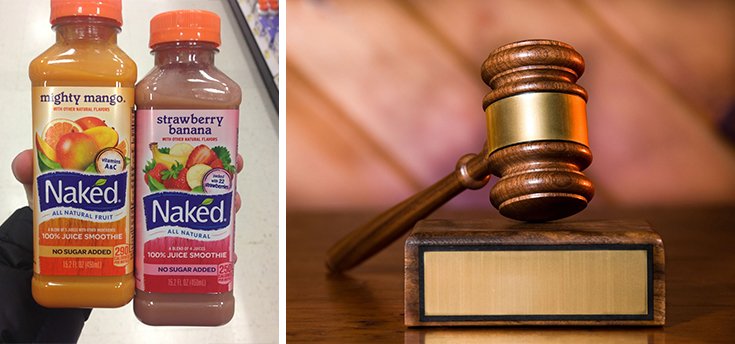PepsiCo Sued for Allegedly Misleading Buyers of Naked Juice

PepsiCo is being sued by buyers who claim the company misleads shoppers into believing its Naked juices and smoothies contain “high-value” ingredients that make them healthier than they really are. [1]

According to the complaint, filed on 4 October 2016 in federal court in Brooklyn, New York, Naked labels feature images of healthy fruits and vegetables, and trumpet how the drinks have “no sugar added,” when they actually contain about as much sugar as a can of Pepsi – more, in some cases.
The lawsuit was filed by the Washington, D.C.-based nonprofit group Center for Science in the Public Interest (CSPI) on behalf of three people.
Dina Lipkind of Brooklyn, Lyle Takeshita of Los Angeles, and Chad Fenwick of Chatsworth, California, claim they overpaid for Naked drinks such as Kale Blazer and Green Machine.
The Allegations
For example, the Kale Blazer label lists “cucumber, spinach, celery and a pinch of ginger” as its main ingredients. However, kale puree is only the 2nd ingredient listed, between “cheap, nutrient-poor” orange and apple juice. Neither fruit is pictured on the label.
The Kale Blazer juice also states that “…you might live forever because kale has tons of antioxidants that combat aging.” [2]
Kale aside, a 15.2 ounce bottle contains a whopping 34 grams of the sweet stuff.
Some Naked products contain as much as 61 grams of sugar. A 12 ounce can of Pepsi contains 41 grams.
CSPI uses the example of Naked’s Pomegranate Blueberry juice to illustrate how PepsiCo misleads shoppers. While it’s true that the product contains no added sugar as the label advertises, the lawsuit states that the claim leads people to believe it contains less sugar than other drinks.
The complaint states that PepsiCo “deliberately cultivates” people’s misperceptions through its marketing of Naked beverages. [1]
Read: Pepsi Wins Battle to Keep Adding Carcinogen to Your Soda
The suit also alleges that PepsiCo does not predominantly disclose that Naked drinks are “not a low-calorie food,” as required by the U.S. Food and Drug Administration (FDA). [2]
The lawsuit seeks class-action status on behalf of shoppers nationwide, and in New York and California. The suit also seeks unspecified damages.
CSPI litigation direction Maia Kats said in a statement:
“Consumers are paying higher prices for the healthful and expensive ingredients advertised on Naked labels, such as berries, cherries, kale, and other greens, and mango. But consumers are predominantly getting apple juice, or in the case of Kale Blazer, orange and apple juice. They’re not getting what they paid for.”
PepsiCo agreed to pay $9 million back in 2013 when it settled a class-action lawsuit that accused the company of using genetically modified organisms (GMOs) in some of its products that were labeled “all natural.”
Read: PepsiCo Tries to Halt Vermont GMO-Labeling Law
They Won’t Go Quietly
PepsiCo thumbed its nose at the lawsuit, calling the allegations “baseless.” [3]
Naked Juice’s general manager Andrea Theodore said:
“I feel confident that consumers have the clear information on our labels and the way that we’ve designed them to understand and make the choices that they need to make. I do not feel at this time that this lawsuit is causing us to rethink we need to do something different here.” [3]
But PepsiCo has made some changes since the lawsuit was filed. As of October 6, the company’s website no longer opens with photos of beverages. Those have been replaced with a statement on a plain green background with the title, “Everything is right there on our bottles.”
If you scroll down the page, you will find images of the labels that CSPI says are misleading.

And as for the allegation that the “no added sugar” claims on the labels leads buyers to believe the beverages are healthier, Theodore said:
“We’re just trying to call out the competitive advantage that we have — that we’re not adding sugar.
“We’ve done a lot of research of what to communicate on our labels and what’s important to consumers. And, when we did our research last, the important thing to them was that they’ve felt duped by some juice brands that do add sugar to their products.”
She noted that the drinks’ calorie counts are displayed prominently on the front of the labels, next to the no-sugar-added label, which she said makes a sugar count unnecessary.
It’s up to individuals, she said, to decide whether they would prefer to purchase something with fewer calories and sugar.
Sources:
[1] Reuters
[2] Fox News
[3] Business Insider
Images Source:

Read read read the ingredients. The tiny amount of all the other ingredients only is there for bragging rights. Most of the stuff is glorified orange and apple juices. Always be leary of “made with” as it doesn’t mean it is made with that one ingredient. I spend way too much time in the grocery store reading all the labels but that is what one has to do not to be bamboozled.
Being a Pepsi product should have been the first warning sign it is full of sugar. Jeez.
Oh brother – I did not know this was a pepsi company!